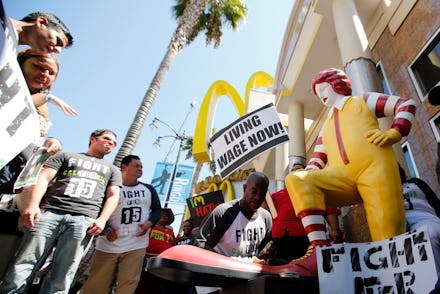You Won't Be Able to Buy a Big Mac Next Thursday, and There's a Very Good Reason

The news: If you're a fan of Big Macs or Whoppers, next Thursday is not going to be your day.
On May 15, fast-food workers in around 150 cities across America will go on a one-day strike. Similar protests have been held since 2012, but this one is expected to be the largest ever. Workers from 34 countries around the world are planning to participate in the event aimed at raising their pay. Workers in the U.S. are fighting for a $15 per hour minimum wage.
"It's amazing that our fight for $15 and a union has inspired workers around the world to come together," said Ashley Cathey, a McDonald's employee in Memphis, Tenn. "The highly profitable fast-food industry needs to know we won't stop fighting until our voices are heard."
American workers in Chicago, Detroit, Los Angeles and New York City are expected to participate along with their global counterparts in Morocco, Japan, Brazil, Dominican Republic, the United Kingdom and more.
The background: This is, of course, largely a minimum wage issue. Raising the pay floor to $15 per hour would more than double the salary of many workers earning the current $7.25. It would also put fast-food restaurants at the same level as Seattle, which recently announced that it would raise its minimum wage to $15 an hour — one of the highest in the world.
One important fast food figure agrees that we should raise the minimum wage: The founder and CEO of Subway, CEO Fred DeLuca said, says an increase wouldn't be such a bad thing for his stores and workers and believes it should be changed so that wages rise automatically with inflation.
But the strikers are also asking for better overall working conditions. Since March, McDonald's has faced a $1 billion class-action law suit regarding wage theft (though a $500 million settlement was eventually reached) and a recent survey found that nearly all fast-food workers have had to deal with stolen paychecks. The protesters are hoping that next week's stunt will provide some much-needed attention on workers' protections and highlight the need for the employees to form their own union.
"This is just the beginning of an unprecedented international fast-food worker movement — and this highly profitable global industry better take note," said Ron Oswald, general secretary of the IUF, which counts 12 million workers as members in 126 countries. He added that fast-food workers in other countries have been inspired to join "in a fight for higher pay and better rights on the job."
Minimum wage across America: Though Congress may still be dragging its feet when it comes to raising the federal minimum wage to $10.10 an hour, individual states and cities are increasingly taking the step of independently raising their respective pay floors: Connecticut, Maryland and Hawaii have already done so. Given the glacial pace with which Congress is addressing the issue, these small-scale measures might be the best bet.
And while it's unlikely much tangible change will come from this one-day strike, it does highlight the fast-food industry's very real need to address minimum wage. The median pay for a fast-food worker in America is just over $9 an hour, or about $18,500 a year — well below the poverty threshold. And though jobs at these restaurants are often seen as part-time gigs for teenagers, workers between 25 and 54 actually hold the biggest share of fast-food jobs, with more than a quarter supporting a child.
Image Credit: Economic Policy Institute
It remains to be seen how impactful this strike will be, but one thing is clear: While these multibillion-dollar corporations reap the profits, many of their employees struggle just to make ends meet. And that's an issue that very much deserves attention, even if you have to miss out on your burger for a day.